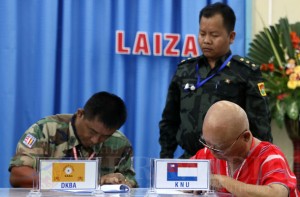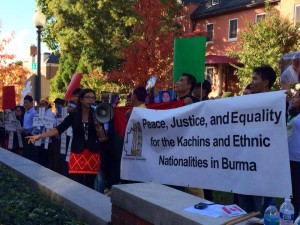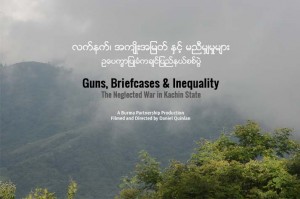Posts Tagged ‘Kachin State’ (265 found)
Nationwide Ceasefire Accord: Not the End Game
 At a historic summit in Laiza, Kachin State, 17 ethnic non-state armed groups agreed to sign the government proposed nationwide ceasefire accord on condition that political dialogue will follow. Of the armed groups who attended this conference, the Restoration Council for Shan State (RCSS) were the only group not to sign, stating that they wanted to consult with Shan political parties and civil society before agreeing.
At a historic summit in Laiza, Kachin State, 17 ethnic non-state armed groups agreed to sign the government proposed nationwide ceasefire accord on condition that political dialogue will follow. Of the armed groups who attended this conference, the Restoration Council for Shan State (RCSS) were the only group not to sign, stating that they wanted to consult with Shan political parties and civil society before agreeing.
A 13-member committee has been formed that will lead negotiations with government minister Aung Min’s peace team in Myitkyina, the capital of Kachin State, starting on 4 November. The conditions to be negotiated with Aung Min include a guarantee that comprehensive political dialogue will be held early next year that will address the role of the Burma Army and greater autonomy for Burma’s ethnic nationalities, something for which they have been fighting for decades.
The 3-day summit was held in Laiza, a town in Kachin Independence Organization (KIO) held territory. Ethnic leaders were greeted by hundreds of supporters on the streets of the town, cheering and singing songs as various leaders arrived. It is of no surprise that ethnic armed groups garner this kind of support. As the summit was being held, Burma Army forces attacked villages in southern Kachin State, displacing around 2,000 people and causing one woman, who was already in bad health, to die while she was sheltering in a church. Burma Army soldiers reportedly opened fire as they entered the five villages under attack […]
Thein Sein Urged To Release Bauk Ja
Burma Campaign UK today urged President Thein Sein to immediately release Bauk Ja and all remaining political prisoners unconditionally. Burma Campaign UK today highlighted Bauk Ja as political prisoner of the month as part of the No Political Prisoner Left Behind Campaign […]
• • •Call to End the War Against Civilians in the Kachin Region of Burma
 Today, members of the Kachin community living in the United States held a demonstration to demand an end of the war against civilians in the Kachin region of Burma in front of the Myanmar Embassy in Washington, D.C.
Today, members of the Kachin community living in the United States held a demonstration to demand an end of the war against civilians in the Kachin region of Burma in front of the Myanmar Embassy in Washington, D.C.
Since the war escalated in the Kachin region, civilians have endured mass atrocities and abuses by the Burma Army […]
• • •Undermining the Peace Process: Burmese Army Atrocities Against Civilians in Putao, Northern Kachin State
Despite ongoing peace negotiations with the Kachin Independence Organization (KIO), in early September 2013 Burmese government troops raided the village of Nhka Ga, near Putao in northern Kachin State, accusing the villagers of supporting the KIA. They detained and tortured ten villagers, shot three men to death, and raped the wife of one of the detainees. The troops have since been encamped in the village, restricting all civilian movement […]
• • •Ongoing Burmese Army Atrocities in Kachin State are Undermining the Peace Process
New documentation by the Kachin Women’s Association Thailand (KWAT) exposes recent atrocities by Burmese government troops against Kachin civilians, despite ongoing peace negotiations.
KWAT’s new update documents abuses committed in Nhka Ga village, near Putao, northern Kachin State, in September 2013 […]
• • •2nd Anniversary of Sumlut Roi Ja Abduction Highlights Impunity in Burma
Today marks the second anniversary of Sumlut Roi Ja, an ethnic Kachin woman, being abducted by the Burmese Army. She is still missing, presumed dead.
Sumlut Roi Ja is a 28-year-old mother who was arrested by Burmese Army soldiers on October 28th 2011 while working on a family’s farm near her village Hkai Bang, close to the China border […]
• • •UN General Assembly: Establish Clear Benchmarks to Address Continuing Abuses in Myanmar
Wartime Abuses in Kachin State, “Ethnic Cleansing” in Rakhine State, Tens of Thousands Denied Access to Aid
The United Nations General Assembly should adopt a strong and comprehensive resolution on the situation of human rights in Myanmar to promote much-needed human rights reform in the country, Fortify Rights said today. When it considers a forthcoming resolution on Myanmar, the UN General Assembly should condemn the wide range of ongoing human rights violations by the government and armed forces of Myanmar and provide clear benchmarks for measurable improvement, including establishing the presence of the UN Office of the High Commissioner for Human Rights (OHCHR) in Myanmar […]
• • •New Film Calls for Political Dialogue for Lasting Peace in Burma’s Kachin State
To coincide with the International Day of Peace, Burma Partnership launched a new documentary film today entitled, “Guns, Briefcases and Inequality: The Neglected War in Kachin State.” The film demonstrates the need for the government of Burma to engage in meaningful political dialogue with all ethnic nationalities on equal terms, including discussing amendments to the 2008 Constitution. These are necessary in order to address the underlying causes of armed conflict: self-determination, the lack of ethnic rights, and inequality, and to move towards lasting peace throughout the country […]
• • •Your Stories Are Ours
Today, in commemoration of the International Day of Peace, we, members of the Global Partnership for the Prevention of Armed Conflict in Southeast Asia (GPPAC-SEA) express our solidarity to all the peace-loving peoples of the region particularly in Myanmar/Burma.
We come from Aceh, Indonesia, Malaysia, Mindanao, Thailand and the Philippines and together with our partners in Myanmar visited Kachin State this week to see, listen and feel for ourselves– however briefly– the situation there following the collapse of a 17-year ceasefire between the Myanmar government and the Kachin Independence Organization (KIO) two years ago […]
• • •Documentary Film: “Guns, Briefcases and Inequality: The Neglected War in Kachin State”
 While President Thein Sein is being applauded internationally for his efforts to build peace in Burma, this new documentary film by Burma Partnership questions whether the government’s current process will really lead to sustainable peace and national reconciliation.
While President Thein Sein is being applauded internationally for his efforts to build peace in Burma, this new documentary film by Burma Partnership questions whether the government’s current process will really lead to sustainable peace and national reconciliation.
“Guns, Briefcases and Inequality: The Neglected War in Kachin State” highlights how development projects and natural resource management are exacerbating armed conflict and human rights violations in ethnic areas, without adequate means to justice for the people. The film demonstrates the need for the government of Burma to engage in meaningful political dialogue with all ethnic nationalities on equal terms to address the underlying causes of armed conflict: self-determination, the lack of ethnic rights, and inequality.









 All posts
All posts